Impact of Social, Political, and Economic Factors on Aboriginal Health
VerifiedAdded on 2023/06/10
|6
|1246
|346
Essay
AI Summary
This essay analyzes the social, political, economic, and cultural factors influencing Aboriginal and Torres Strait Islander (ATSI) health. It highlights how these factors, including political oppression, economic disadvantage, and cultural differences, impact health outcomes and access to healthcare services. The essay explores the interrelation of these determinants, such as education, environment, and housing, with specific examples like alcohol taxation and discrimination. It also examines the impact of Westernized systems on ATSI engagement with healthcare, emphasizing the differences in cultural beliefs, authority structures, and the significance of traditional practices. The assignment also discusses chronic health issues, racism, and the impact of low income on ATSI communities. The essay concludes by discussing the implications of cultural differences on healthcare engagement for both care receivers and providers.
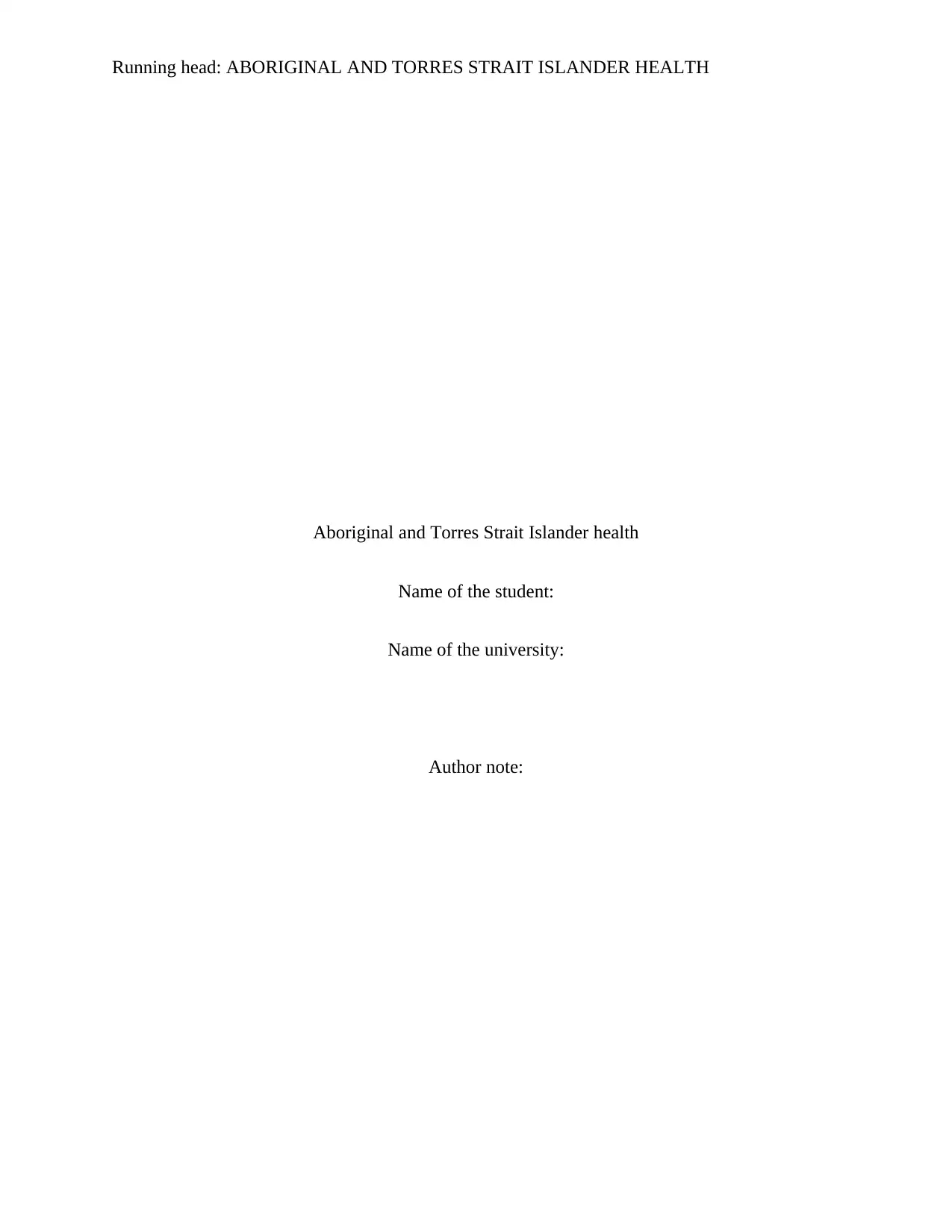
Running head: ABORIGINAL AND TORRES STRAIT ISLANDER HEALTH
Aboriginal and Torres Strait Islander health
Name of the student:
Name of the university:
Author note:
Aboriginal and Torres Strait Islander health
Name of the student:
Name of the university:
Author note:
Paraphrase This Document
Need a fresh take? Get an instant paraphrase of this document with our AI Paraphraser
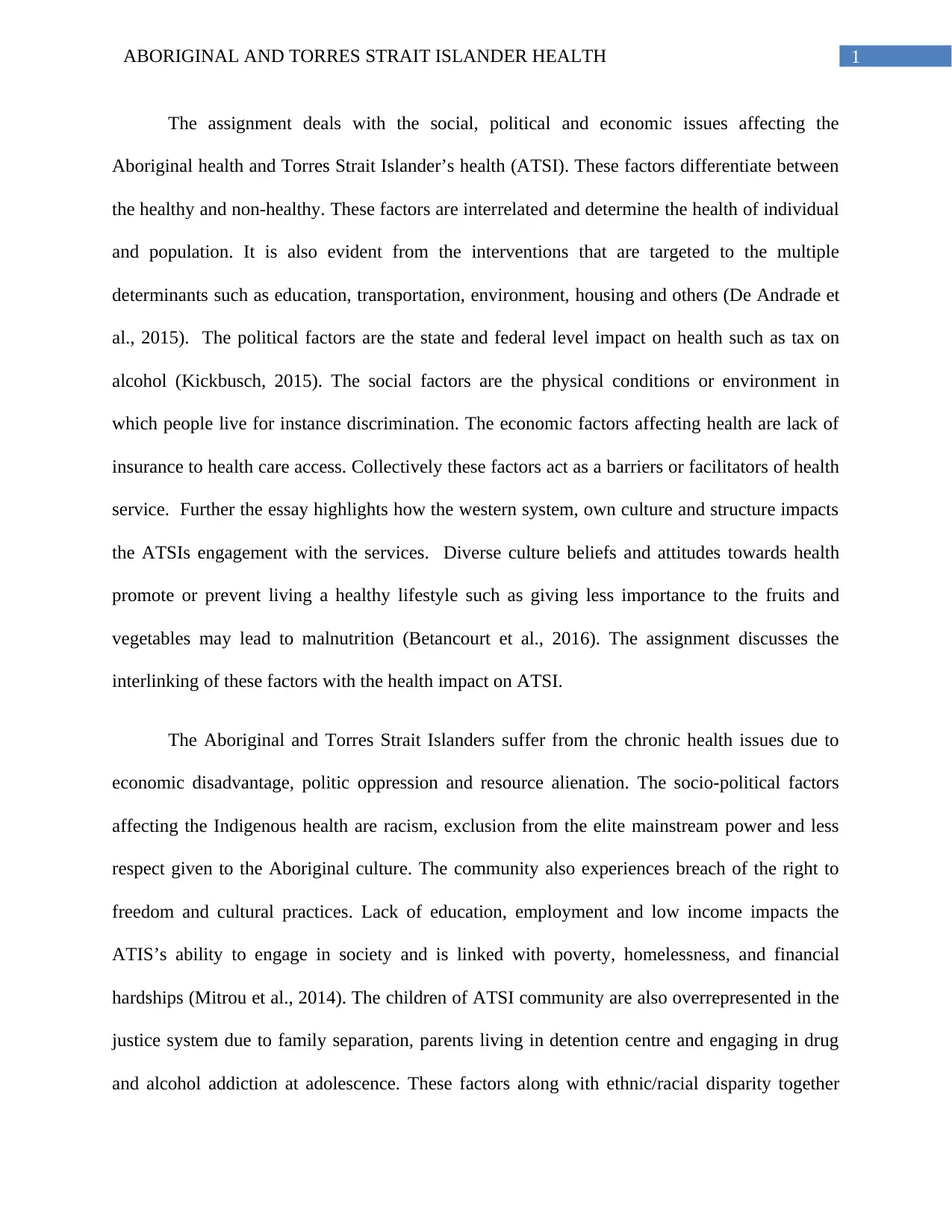
1ABORIGINAL AND TORRES STRAIT ISLANDER HEALTH
The assignment deals with the social, political and economic issues affecting the
Aboriginal health and Torres Strait Islander’s health (ATSI). These factors differentiate between
the healthy and non-healthy. These factors are interrelated and determine the health of individual
and population. It is also evident from the interventions that are targeted to the multiple
determinants such as education, transportation, environment, housing and others (De Andrade et
al., 2015). The political factors are the state and federal level impact on health such as tax on
alcohol (Kickbusch, 2015). The social factors are the physical conditions or environment in
which people live for instance discrimination. The economic factors affecting health are lack of
insurance to health care access. Collectively these factors act as a barriers or facilitators of health
service. Further the essay highlights how the western system, own culture and structure impacts
the ATSIs engagement with the services. Diverse culture beliefs and attitudes towards health
promote or prevent living a healthy lifestyle such as giving less importance to the fruits and
vegetables may lead to malnutrition (Betancourt et al., 2016). The assignment discusses the
interlinking of these factors with the health impact on ATSI.
The Aboriginal and Torres Strait Islanders suffer from the chronic health issues due to
economic disadvantage, politic oppression and resource alienation. The socio-political factors
affecting the Indigenous health are racism, exclusion from the elite mainstream power and less
respect given to the Aboriginal culture. The community also experiences breach of the right to
freedom and cultural practices. Lack of education, employment and low income impacts the
ATIS’s ability to engage in society and is linked with poverty, homelessness, and financial
hardships (Mitrou et al., 2014). The children of ATSI community are also overrepresented in the
justice system due to family separation, parents living in detention centre and engaging in drug
and alcohol addiction at adolescence. These factors along with ethnic/racial disparity together
The assignment deals with the social, political and economic issues affecting the
Aboriginal health and Torres Strait Islander’s health (ATSI). These factors differentiate between
the healthy and non-healthy. These factors are interrelated and determine the health of individual
and population. It is also evident from the interventions that are targeted to the multiple
determinants such as education, transportation, environment, housing and others (De Andrade et
al., 2015). The political factors are the state and federal level impact on health such as tax on
alcohol (Kickbusch, 2015). The social factors are the physical conditions or environment in
which people live for instance discrimination. The economic factors affecting health are lack of
insurance to health care access. Collectively these factors act as a barriers or facilitators of health
service. Further the essay highlights how the western system, own culture and structure impacts
the ATSIs engagement with the services. Diverse culture beliefs and attitudes towards health
promote or prevent living a healthy lifestyle such as giving less importance to the fruits and
vegetables may lead to malnutrition (Betancourt et al., 2016). The assignment discusses the
interlinking of these factors with the health impact on ATSI.
The Aboriginal and Torres Strait Islanders suffer from the chronic health issues due to
economic disadvantage, politic oppression and resource alienation. The socio-political factors
affecting the Indigenous health are racism, exclusion from the elite mainstream power and less
respect given to the Aboriginal culture. The community also experiences breach of the right to
freedom and cultural practices. Lack of education, employment and low income impacts the
ATIS’s ability to engage in society and is linked with poverty, homelessness, and financial
hardships (Mitrou et al., 2014). The children of ATSI community are also overrepresented in the
justice system due to family separation, parents living in detention centre and engaging in drug
and alcohol addiction at adolescence. These factors along with ethnic/racial disparity together
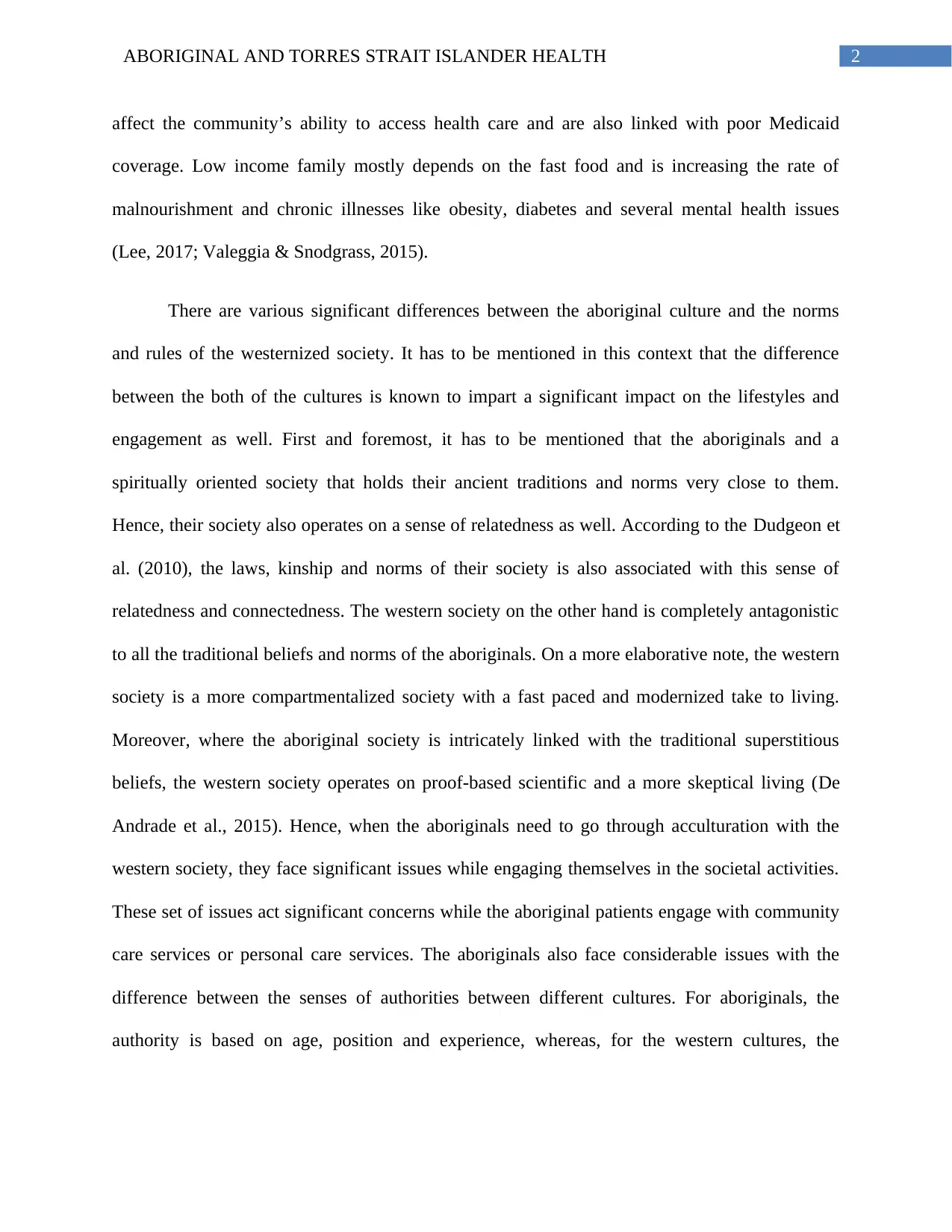
2ABORIGINAL AND TORRES STRAIT ISLANDER HEALTH
affect the community’s ability to access health care and are also linked with poor Medicaid
coverage. Low income family mostly depends on the fast food and is increasing the rate of
malnourishment and chronic illnesses like obesity, diabetes and several mental health issues
(Lee, 2017; Valeggia & Snodgrass, 2015).
There are various significant differences between the aboriginal culture and the norms
and rules of the westernized society. It has to be mentioned in this context that the difference
between the both of the cultures is known to impart a significant impact on the lifestyles and
engagement as well. First and foremost, it has to be mentioned that the aboriginals and a
spiritually oriented society that holds their ancient traditions and norms very close to them.
Hence, their society also operates on a sense of relatedness as well. According to the Dudgeon et
al. (2010), the laws, kinship and norms of their society is also associated with this sense of
relatedness and connectedness. The western society on the other hand is completely antagonistic
to all the traditional beliefs and norms of the aboriginals. On a more elaborative note, the western
society is a more compartmentalized society with a fast paced and modernized take to living.
Moreover, where the aboriginal society is intricately linked with the traditional superstitious
beliefs, the western society operates on proof-based scientific and a more skeptical living (De
Andrade et al., 2015). Hence, when the aboriginals need to go through acculturation with the
western society, they face significant issues while engaging themselves in the societal activities.
These set of issues act significant concerns while the aboriginal patients engage with community
care services or personal care services. The aboriginals also face considerable issues with the
difference between the senses of authorities between different cultures. For aboriginals, the
authority is based on age, position and experience, whereas, for the western cultures, the
affect the community’s ability to access health care and are also linked with poor Medicaid
coverage. Low income family mostly depends on the fast food and is increasing the rate of
malnourishment and chronic illnesses like obesity, diabetes and several mental health issues
(Lee, 2017; Valeggia & Snodgrass, 2015).
There are various significant differences between the aboriginal culture and the norms
and rules of the westernized society. It has to be mentioned in this context that the difference
between the both of the cultures is known to impart a significant impact on the lifestyles and
engagement as well. First and foremost, it has to be mentioned that the aboriginals and a
spiritually oriented society that holds their ancient traditions and norms very close to them.
Hence, their society also operates on a sense of relatedness as well. According to the Dudgeon et
al. (2010), the laws, kinship and norms of their society is also associated with this sense of
relatedness and connectedness. The western society on the other hand is completely antagonistic
to all the traditional beliefs and norms of the aboriginals. On a more elaborative note, the western
society is a more compartmentalized society with a fast paced and modernized take to living.
Moreover, where the aboriginal society is intricately linked with the traditional superstitious
beliefs, the western society operates on proof-based scientific and a more skeptical living (De
Andrade et al., 2015). Hence, when the aboriginals need to go through acculturation with the
western society, they face significant issues while engaging themselves in the societal activities.
These set of issues act significant concerns while the aboriginal patients engage with community
care services or personal care services. The aboriginals also face considerable issues with the
difference between the senses of authorities between different cultures. For aboriginals, the
authority is based on age, position and experience, whereas, for the western cultures, the
⊘ This is a preview!⊘
Do you want full access?
Subscribe today to unlock all pages.

Trusted by 1+ million students worldwide
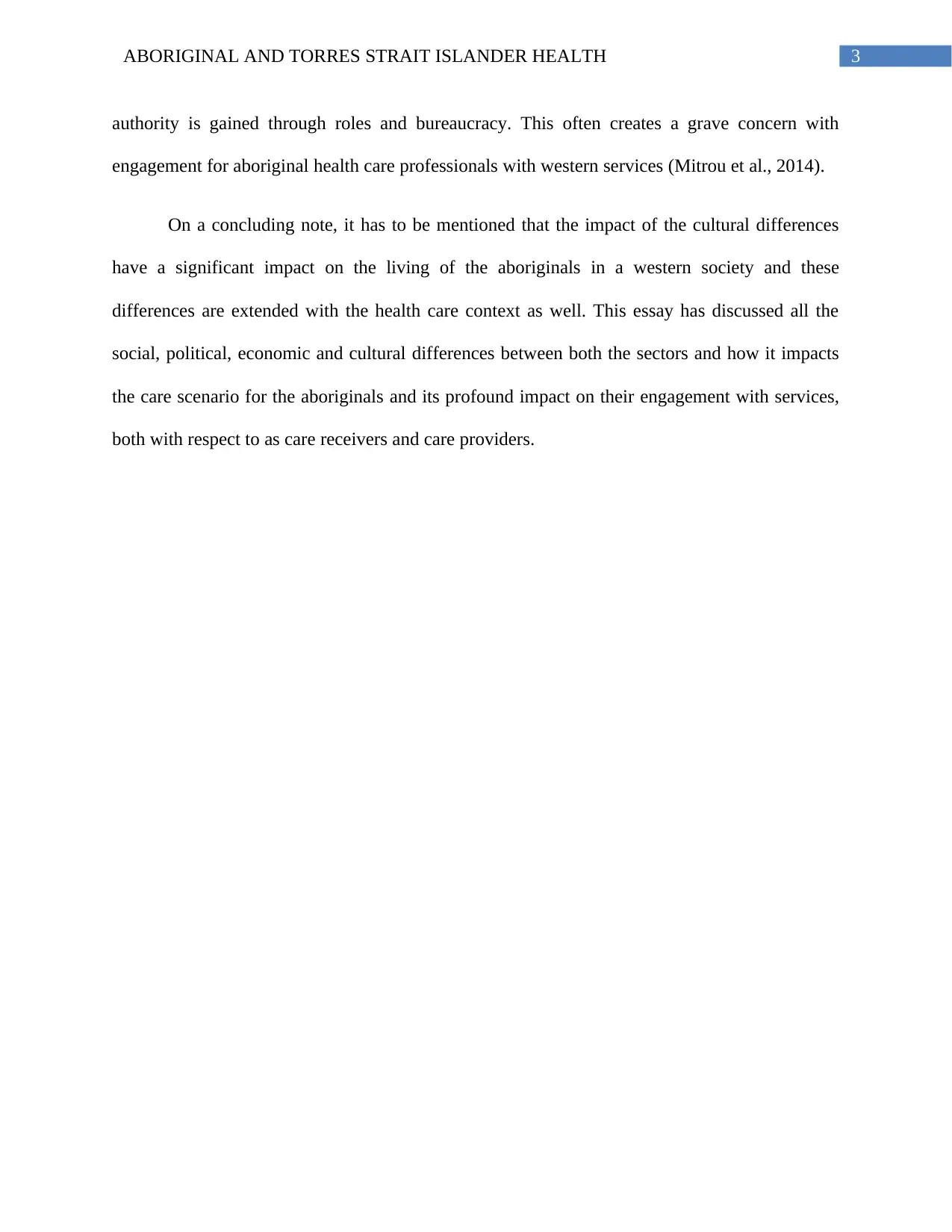
3ABORIGINAL AND TORRES STRAIT ISLANDER HEALTH
authority is gained through roles and bureaucracy. This often creates a grave concern with
engagement for aboriginal health care professionals with western services (Mitrou et al., 2014).
On a concluding note, it has to be mentioned that the impact of the cultural differences
have a significant impact on the living of the aboriginals in a western society and these
differences are extended with the health care context as well. This essay has discussed all the
social, political, economic and cultural differences between both the sectors and how it impacts
the care scenario for the aboriginals and its profound impact on their engagement with services,
both with respect to as care receivers and care providers.
authority is gained through roles and bureaucracy. This often creates a grave concern with
engagement for aboriginal health care professionals with western services (Mitrou et al., 2014).
On a concluding note, it has to be mentioned that the impact of the cultural differences
have a significant impact on the living of the aboriginals in a western society and these
differences are extended with the health care context as well. This essay has discussed all the
social, political, economic and cultural differences between both the sectors and how it impacts
the care scenario for the aboriginals and its profound impact on their engagement with services,
both with respect to as care receivers and care providers.
Paraphrase This Document
Need a fresh take? Get an instant paraphrase of this document with our AI Paraphraser
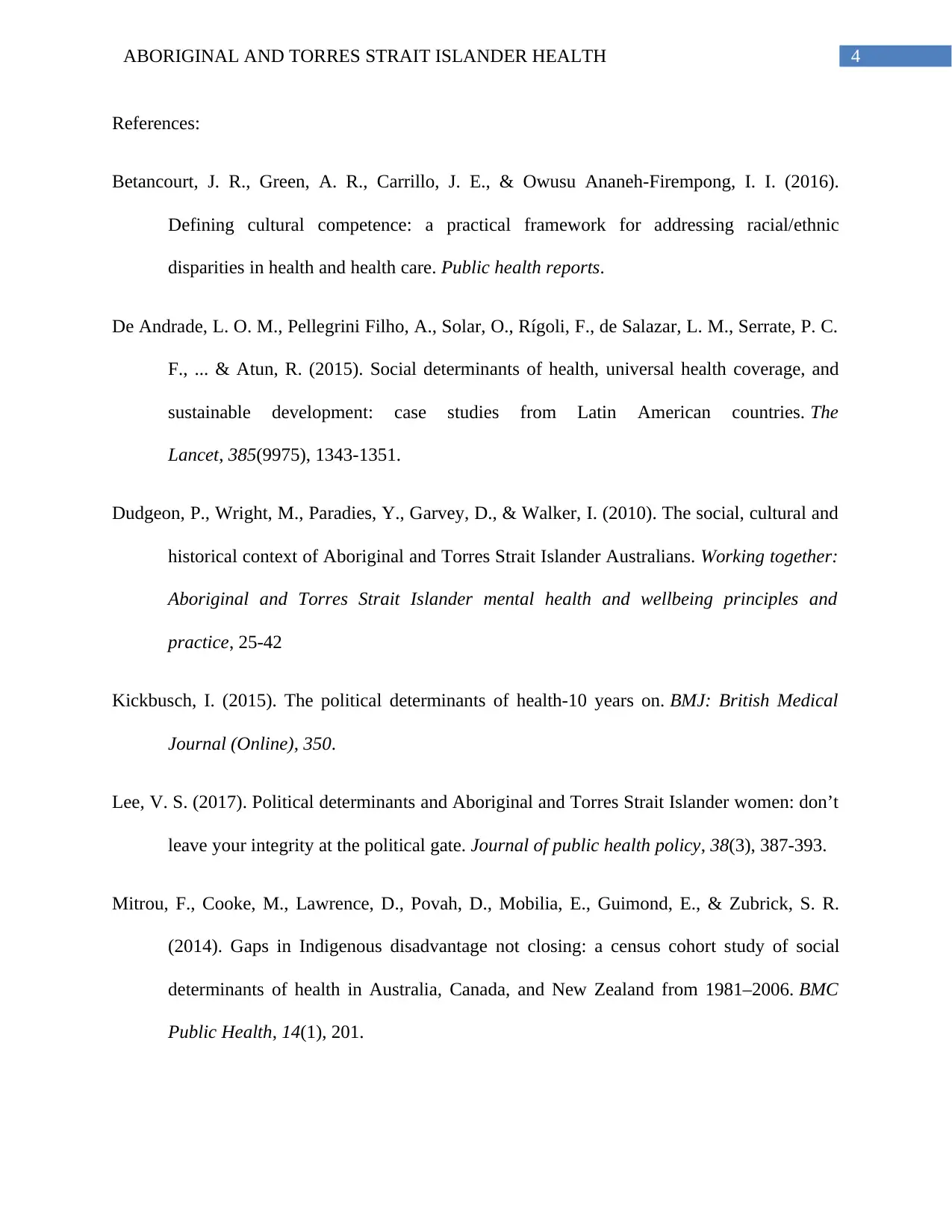
4ABORIGINAL AND TORRES STRAIT ISLANDER HEALTH
References:
Betancourt, J. R., Green, A. R., Carrillo, J. E., & Owusu Ananeh-Firempong, I. I. (2016).
Defining cultural competence: a practical framework for addressing racial/ethnic
disparities in health and health care. Public health reports.
De Andrade, L. O. M., Pellegrini Filho, A., Solar, O., Rígoli, F., de Salazar, L. M., Serrate, P. C.
F., ... & Atun, R. (2015). Social determinants of health, universal health coverage, and
sustainable development: case studies from Latin American countries. The
Lancet, 385(9975), 1343-1351.
Dudgeon, P., Wright, M., Paradies, Y., Garvey, D., & Walker, I. (2010). The social, cultural and
historical context of Aboriginal and Torres Strait Islander Australians. Working together:
Aboriginal and Torres Strait Islander mental health and wellbeing principles and
practice, 25-42
Kickbusch, I. (2015). The political determinants of health-10 years on. BMJ: British Medical
Journal (Online), 350.
Lee, V. S. (2017). Political determinants and Aboriginal and Torres Strait Islander women: don’t
leave your integrity at the political gate. Journal of public health policy, 38(3), 387-393.
Mitrou, F., Cooke, M., Lawrence, D., Povah, D., Mobilia, E., Guimond, E., & Zubrick, S. R.
(2014). Gaps in Indigenous disadvantage not closing: a census cohort study of social
determinants of health in Australia, Canada, and New Zealand from 1981–2006. BMC
Public Health, 14(1), 201.
References:
Betancourt, J. R., Green, A. R., Carrillo, J. E., & Owusu Ananeh-Firempong, I. I. (2016).
Defining cultural competence: a practical framework for addressing racial/ethnic
disparities in health and health care. Public health reports.
De Andrade, L. O. M., Pellegrini Filho, A., Solar, O., Rígoli, F., de Salazar, L. M., Serrate, P. C.
F., ... & Atun, R. (2015). Social determinants of health, universal health coverage, and
sustainable development: case studies from Latin American countries. The
Lancet, 385(9975), 1343-1351.
Dudgeon, P., Wright, M., Paradies, Y., Garvey, D., & Walker, I. (2010). The social, cultural and
historical context of Aboriginal and Torres Strait Islander Australians. Working together:
Aboriginal and Torres Strait Islander mental health and wellbeing principles and
practice, 25-42
Kickbusch, I. (2015). The political determinants of health-10 years on. BMJ: British Medical
Journal (Online), 350.
Lee, V. S. (2017). Political determinants and Aboriginal and Torres Strait Islander women: don’t
leave your integrity at the political gate. Journal of public health policy, 38(3), 387-393.
Mitrou, F., Cooke, M., Lawrence, D., Povah, D., Mobilia, E., Guimond, E., & Zubrick, S. R.
(2014). Gaps in Indigenous disadvantage not closing: a census cohort study of social
determinants of health in Australia, Canada, and New Zealand from 1981–2006. BMC
Public Health, 14(1), 201.
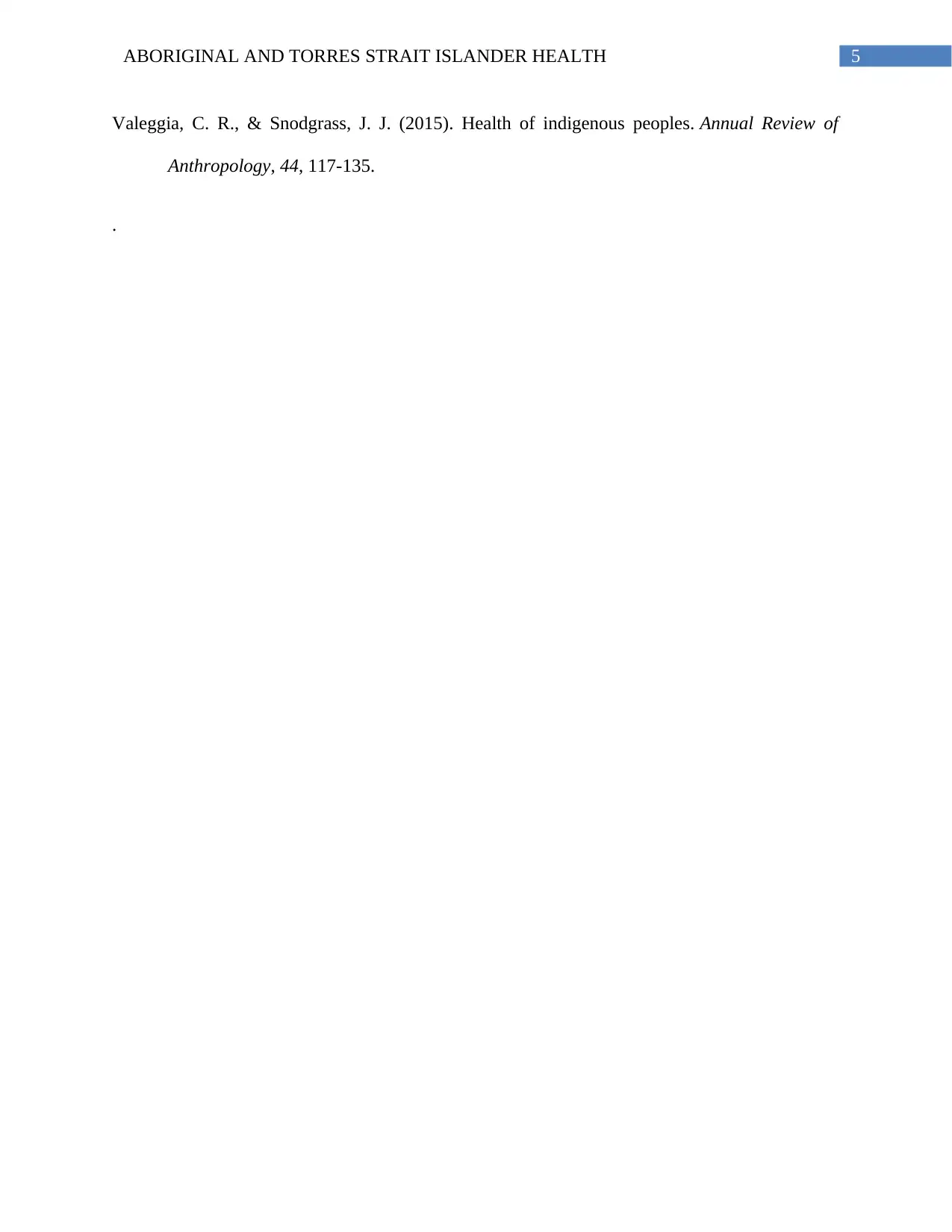
5ABORIGINAL AND TORRES STRAIT ISLANDER HEALTH
Valeggia, C. R., & Snodgrass, J. J. (2015). Health of indigenous peoples. Annual Review of
Anthropology, 44, 117-135.
.
Valeggia, C. R., & Snodgrass, J. J. (2015). Health of indigenous peoples. Annual Review of
Anthropology, 44, 117-135.
.
⊘ This is a preview!⊘
Do you want full access?
Subscribe today to unlock all pages.

Trusted by 1+ million students worldwide
1 out of 6
Related Documents
Your All-in-One AI-Powered Toolkit for Academic Success.
+13062052269
info@desklib.com
Available 24*7 on WhatsApp / Email
![[object Object]](/_next/static/media/star-bottom.7253800d.svg)
Unlock your academic potential
Copyright © 2020–2026 A2Z Services. All Rights Reserved. Developed and managed by ZUCOL.




